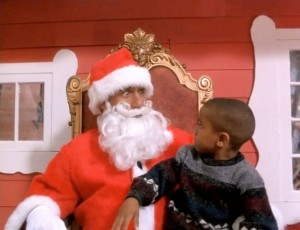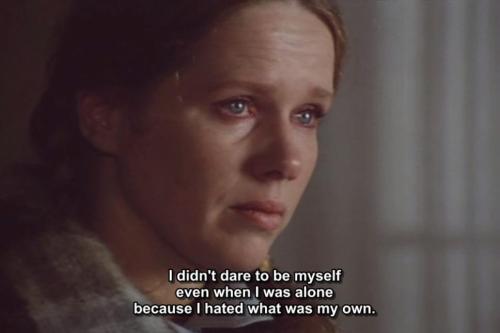One way to properly analyze Terrence Malick’s The Tree of Life, would be to compare the ideologies and philosophies with G.W. Leibniz’s Principles of Nature and Grace. But, more relatable then Malick’s philosophy in Tree of Life – which can be found as the main theme and structure for all his films – is the building psychology that overcome large amounts of the picture, and compliments this philosophy. I’ve discovered I can most accurately portray this psychology through Mary Shelley’s Frankenstein.
Relevant Tangent: When I learned to criticize film, for structure and technique and all the things I've come to love, it makes the process become more involved, in which, there is constant thinking; but, sometimes this process is lost. I’ll be watching the screen and sent into a trance. It’s warm and I can’t move and I don't want to. It’s like I’m sleeping comfortably with my eyes open but retaining the information on screen, and I’ve been sucked into a fairy tale. All films are fairy tales: the dramas, the comedies, the horrors, the fantasies, the sci-fi’s, the romances and everything more and in between. Maybe a water glass will clink or a friend will cough and pull me from this hypnosis, then I can think about what I’m watching for a little, until I’m filled again with this euphoria.
Back from tangent: This is what happened during Tree of Life. I felt like some relation I had to the film was so strong but I couldn’t find it. I understand great films serve the purpose of timelessness, but why is it timeless to me? After a series of rumination, and a second viewing, I found at least one purpose for my love: The characterization of abstract psychology portrayed through Young Jack, played by Hunter McCracken. And I've felt this strange relation once before.
If you've read Frankenstein, you'll remember there’s a large portion of the novel (chapters 11 - 16) that deals with a similar psychology of Young Jack, but instead with Frankenstein's monster. We see both these characters from their birth and follow them through the senses they experience, the emotions that change them, and the knowledge they acquire.
I’d always explain to people, one of the reasons for my love of Frankenstein was because of Mary Shelley’s detailed articulation of what we might've experienced as new borns and children, and, if we'd been able to express it from memory. Never had I before or after read something so revelatory of this process, and in a language so philosophical and poetic. The beginnings of the creatures most basic developments are explained mostly in the beginning of chapter 11:
“A strange multiplicity of sensations seized me, and I saw, felt, heard, and smelt, at the same time: and it was, indeed, a long time before I learned to distinguish between the operation of my various senses."
"By degrees, I remember, a stronger light pressed upon my nerves, so that I was obliged to shut my eyes. Darkness then came over me, and troubled me; but hardly had I felt this, when, by opening my eyes, as I now suppose, the light poured in upon me again."
"I walked, and, I believe, descended; but I presently found a great alteration in my sensations."
"Before, dark and opaque bodies had surrounded me, impervious to my touch or sight: but I now found that I could wander on at liberty, with no obstacles which I could not either surmount or avoid. The light became more and more oppressive to me: and, the heat wearying me as I walked, I sought a place where I cold receive shade.”
“I started up, and beheld a radiant form rise from among the trees.”
“No distinct ideas occupied my mind: all was confused”
I can almost remember my birth.
I compare these screen shots, not because they’re directly related to Frankenstein, but because it’s interesting to compare imagery to text, especially when they’re so closely related. How else do we memorize and remember. It’s important to instill imagery on passages to better understand the passage, and helps to retain this information. I also do this because the second time I read Frankenstein, I couldn’t help but think of the vast images from Tree of Life, and thought it would be fun to pair them together.
After a month or so, I realized when I'd explain my love for Tree of Life, I'd compare it to my love of the growing psychology in Frankenstein, as compared to Young Jack. There are other elements and themes of each medium that I could process and analyze for days, but for me, these are the most relatable and how I am able to best explain my interest in both.
But where Frankenstein leaves this progression of human psychological development, TOL takes over. There are, of course, moments in the next few chapters that deal with similar events of the development of abstraction of thought, but most of the psychology (and many other themes important to the novels narrative) comes from a family the monster encounters and deals more with the development of his relation to them. That’s why I say TOL, “takes over” in this psychology; more generally for us to relate to personally. But I will still be using quotes from time to time in the screen shots I present.
According to psychologists, such as -- and starting with -- Carl Hung, to Jean Piaget's more well known abstract theory, abstract thinking in Cognitive Development of the Formal operational stage (the final stage in Piaget’s theory of cognitive development), starts to occur within the ages of 11 and 12 and continues into adulthood. This is the age in which we follow most of Young Jack’s childhood. Malick shows us this development, through Jack’s relation to his parents, God, his brothers and himself, while also incorporating narration of Jack’s thoughts.
The first time we encounter his evolving thoughts, he sees men being pulled into police cars, in handcuffs and chains.
"Can it happen to anyone?"
"Nobody talks about it."
The film then cuts to Jack, in bed, praying to God.
"Help me not to sass my dad. Help me not to get in fights."
Whenever we return to the convicts, it's from the perspective of Jack - camera low to the ground, looking up, like a child. It's important to remember that because everything we see is through Jack, we must interpret imagery as a pre-teen. Are the lines of narration also apart of the prayer? Is it a tangent thought while he was praying, or a separate thought entirely at a different time? Are these visualizations important to his prayer and what he's praying for? Maybe Jack is praying because he feels he could end up like those men, and wishes not to. These lines and imagery, are our first steps into the growing abstractions of Jack's maturity.
The second abstraction of thought deals with jealousy. No narration, only expression as Jack watches his younger brother (middle brother: R.L, played by Tye Shariddon) bond with his father (Mr. O'Brien, played by Brad Pitt) through his musical ability. A trait in which, Jack, does not share.
"The Mysteries Barriers"
We come to a small moment of death.
"Being thus provided, I resolved to reside in this hovel..."
From jealousy, we then develop into guilt and regret. Jack: breaks into a neighbors home while they're gone, steals a dress of the young women who lives there, and runs away with it, eventually taking it to the river and throwing the dress into it. Letting it float on with the current to be lost.
Now, it's a bit hard to catch onto from the first viewing (because of the subtle editing). We see the apology to his mother before this sequence happens, and at first I thought the guilt and regret was related to earlier scenes in which Jack attaches a frog to a firecracker rocket and lights it into the sky. But, if you go through it closely, you can see the clothes he's wearing when apologizing to his mother (Mrs. O'Brien played by Jessica Chastain) are different from the frog sequence, but the same as the stealing sequence. But you'll also notice that Mrs O'Briens clothes are different in both sequences. Still, among this confusion, my heart goes out to the poor frog....
The frog sequence -
Jack's thought narration - "Liar."
Kitchen sequence -
Mrs. O'Brien - "Never do it again...promise?
*Jack nods his head, yes*
Jack - "You gonna tell, dad?"
*she walks away without answering*
And the dress sequence -
Jack - "I can't talk to you."
Jack - "Don't look at me."
Does Jack later tell his mother about this, and that's when she's talking to him in the kitchen? Or was it about the frog? I think it's the first but if it's the ladder, that could just be a continuity problem (or she could've just changed her clothes), but both would still be a factor of abstraction dealing with those same emotions of guilt; but, also a growing sense of adrenaline, hormones and experiencing a new taste of sub-emotions. I think the kitchen sequence might encompass both Jack's experiences and is relatable to both situations because they deal with those emotions discussed before.
Hunter McCracken - along with the other brothers (Tye Sheridan and Laramie Eppler) - does some of the best child acting I've seen since Paper Moon (excluding foreign film child actors, because c'mon, they're just better). Without the skills McCracken possesses, and the natural surreality Malick directs with, it would be impossible to translate this psychology, that's, so completely relatable. This is what it was like to be an 11 year old boy: I've done it before and I can feel it here; all the emotion and every thought Jack has spoken with his voice or his facial expressions and actions.
The following deals with Trust and Power, but it's the "why", that becomes confusing. In this sequences, Jack pressures his brother into touching the lamp socket with a metal rod.
Jack - "C'mon. Touch it."
R.L. - "See, I trust you"
Jack has gained a new sense of power, that is, through R.L's trust in him. He, later, takes advantage of this trust.
Below is another example of his jealousy that enrages his power of trust.
Below, I thought I'd throw in some Freudian psychology for fun.
I don't want to bore you, nor do I want to show you the whole film, but I must express my love in one last form of emotion: hatred and anger. I think Jack still has love for his father, and in his developing psyche is consumed by the jealousy, which turns into hatred for his father. Not to say his father's doing nothing wrong - he's a strict, regretful man who doesn't know how to show his love, and was probably treated the same by his father - but both of these are contributing factores for the following. In this sequence, we hear nothing but a deep drumming noise and the diegetic sounds within. I believe this drum noise comes from a different register of Francesco Lupica's Cosmic Beam instrument (a noise which I believe was omitted in some of the DVD versions). We see Jack circle around his father; wondering, ruminating, plotting. If only he could kill his father. What would happen? Would anyone see?
Narration - "Please God, kill him."
And after this, a strange sense of jealousy, which is presented to tie more fluidly into his power over R.L.
"Let him die."
"She only loves me!"
We then return to R.L's trust as Jack coaxes him to put his finger on a BB-gun.
"Put your finger over it."
"Like that."
Shame and regret, like his father.
Always,










































































